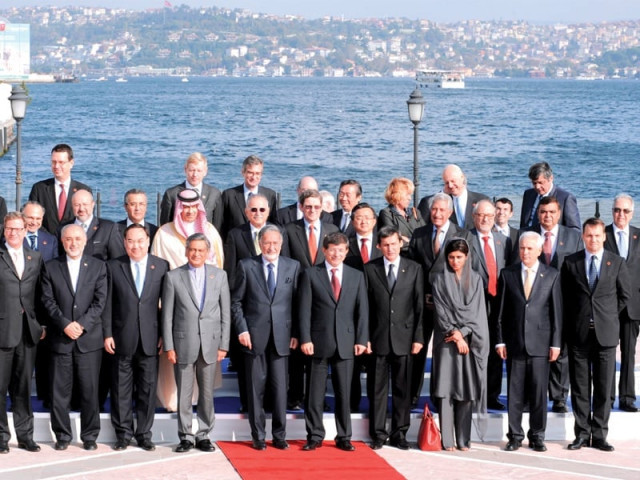Istanbul conference ends with a whimper
Pakistan, Russia, China, Iran put up opposition to US plans for setting up permanent military bases in Afghanistan.

Istanbul conference ends with a whimper
Notwithstanding political rhetoric and promises of cooperation, a much-publicised conference, which was aimed at mapping out Afghanistan’s future after the departure of western forces, failed to achieve a major breakthrough on Wednesday.
The daylong conference in the Turkish city of Istanbul brought together representatives from some two dozen countries as well as international organisations such as Nato, the EU and the United Nations.
Afghanistan’s immediate neighbours voiced their reservations over US plans to establish permanent military bases in the country and a “new regional mechanism” for the Afghan endgame.
Pakistan, China, Russia and Iran joined hands to oppose the US plans to maintain a military presence in Afghanistan beyond 2014, a Pakistani diplomat, who attended the conference, told The Express Tribune by phone from Istanbul.
The diplomat, who wished to remain anonymous because of the sensitivity of the matter, said that Afghanistan’s neighbouring countries sought clarity from the US over its proposed plans.
Officially, Washington denies that it’s seeking permanent bases for its troops in the country where it has been fighting a deadly Taliban insurgency for a decade now.
The Istanbul conference was the first of two key meetings aimed at facilitating a smooth transition in Afghanistan. However, analysts say the success of the second conference scheduled to be convened in the German city of Bonn on December 5 hinges on the outcome of the Istanbul conference.
Pakistan had pinned little hope on the Istanbul meeting because of divergences in the approaches of key players over certain strategic issues.
“We maintained a low profile at the conference. We were there as a listener,” the Pakistani diplomat said. He said that Pakistan, along with Russia, China and Iran, not only voiced concerns over the US plans for military bases in Afghanistan but also opposed a new regional mechanism for peace and security in the region. The strong opposition prompted the host Turkey and the United States to drop the original Istanbul draft that proposed the formation of a contact group, which comprised, besides other countries, India, which does not share a border with Afghanistan.
Instead, the participants agreed on a revised declaration, which according to analysts, consists of nothing but rhetoric.
According to the declaration, the participants signed up to a package of “confidence-building measures” for cooperation in fields including security, reconstruction and health and the fight against “terrorism” and drug trafficking.
They vowed to “respect Afghanistan’s sovereignty, unity and territorial integrity,” the declaration said. “They also discussed guarantees for non-intervention and non-interference in the internal affairs of other states and peaceful settlement of disputes in accordance with international law.”
In her speech, Foreign Minister Hina Rabbani Khar was quoted as telling the conference that Afghan solution and overall security of the region must be found within the existing arrangements.
She emphasised the need for strengthening the Economic Cooperation Organisation (ECO) and Shangai Cooperation Organisation to address security and economic issues of the region.
Afghan President Hamid Karzai, on the other hand, made his oft-repeated call for dismantling terrorist safe havens outside the borders of Afghanistan. Though he did not name any country, the reference was obviously to Pakistan.
“Terrorist networks are by far the major threat to Afghanistan’s security,” Karzai said. “They continue to have sanctuaries outside of our border from where they conduct their merciless campaign of destruction,” he said.
“Unless regional cooperation is assured to address the core and root of this issue, peace in Afghanistan will remain elusive,” he added.
A decade on, the Taliban insurgents remain a deadly force in Afghanistan, continuing to wage attacks against Afghan and coalition forces. Washington and Kabul have complained that Islamabad is not doing enough against the Taliban and al Qaeda militants who have found refuge in Pakistani tribal areas on the Afghan border.
(WITH ADDITIONAL INPUT FROM agencies)
Published in The Express Tribune, November 3rd, 2011.


1724319076-0/Untitled-design-(5)1724319076-0-208x130.webp)
















COMMENTS
Comments are moderated and generally will be posted if they are on-topic and not abusive.
For more information, please see our Comments FAQ